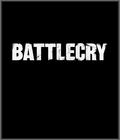Sometimes you have to read between the lines. Battlecry is Bethseda's "entry into the free-to-play space," which is to say they're very consciously attempting to compete with Team Fortress 2. Battlecry is about as thematically dissimilar from TF2 as you can get without switching genres entirely, but in play, the sheer speed, frantic movement, and short player lifespan are all there.
Battlecry is set in a "world without gunpowder," where wars are still fought using bows, shields and swords. The idea is to provoke strong contrasts; the phrase used during E3 was that Battlecry's world is where "brutality and beauty collide." You'll get to see surprisingly evocative anti-war graffiti and paintings while simultaneously bisecting an enemy swordsman.
There will be up to three playable factions in the final version, two of which were available at E3 2014: the Cossack Empire and the Royal Marines. You can also play one of five classes: the Duelist, Enforcer, Tech Archer, Brawler and Gadgeteer. The first three were available for hands-on play at E3. The Duelist is a speed-based character that specializes in finding ways to narrow gaps between herself and the enemy, the Enforcer is a tank who can employ his weapon as both a massive two-handed sword or a shield, and the Tech Archer is a ranged class that peppers her opponents with arrows but is slightly hamstrung by needing to "charge" before her shots do any real damage. Each class has a host of unique abilities, such as the Duelist using a quick lunge to cover the distance between herself and a target, the Enforcer delivering a swinging whirlwind attack, or the Tech Archer being able to turn on a "radar" and highlight nearby enemies through walls.
You have a lot of movement abilities in Battlecry. Every character comes standard with an evasive roll, done by pushing the jump button again while in mid-air, allowing the character to do a rapid forward dive that takes them well out of harm's way. You can also use a grappling hook to latch onto certain labeled nodes to propel your character over walls, onto ledges, and sometimes across chasms. Successful attacks also generate Adrenaline, which can be spent in small increments to fuel special moves or, once you've filled the meter, all at once to activate an "ultimate." At that point, you seem to be invincible and enjoy a massive bonus to attack power, which let me take on the entire enemy team at once and come out ahead.
The emphasis on melee combat, for the most part, means the game is very focused on team play and evasion. If you're cornered or you try to take on more than one opponent at once, you're in serious trouble. When playing it on the show floor, the general theme seemed to be cooperation and team tactics, as anyone who was trying to go it alone was usually dead meat unless he or she had a full Adrenaline meter.
As you play Battlecry, you accumulate a currency called Iron, which can be spent on new weapons and ways to customize your characters, such as personalizing their uniforms or even switching their gender. What's a bit more interesting is how, at the end of a round, you have the option of saluting the highest-scoring player, whether he or she is on your team or not, in exchange for a slight bonus to the Iron you've personally earned through participation. Good sportsmanship in Battlecry actually has a slight but immediate reward, which seems to go hand-in-hand with the early-20th-century aesthetic it's going for. Yes, you're going to be cutting people limb from limb on an intensely specious pretext, but there's no reason to be rude about it.
A few different free-to-play games were announced at E3 this year, and Battlecry was arguably the highest-profile of the lot. It's got its own feel, and a lot of thought's been put into its design, but it seems to be going directly against some real juggernauts in the field. If you're looking for a head-to-head fighter with a lot of personality, it may pay to keep an eye on Battlecry.
More articles about Battlecry













 BattleCry is an all-new free-to-play multiplayer action combat game featuring fast-paced and frenetic 32-player battles.
BattleCry is an all-new free-to-play multiplayer action combat game featuring fast-paced and frenetic 32-player battles.




